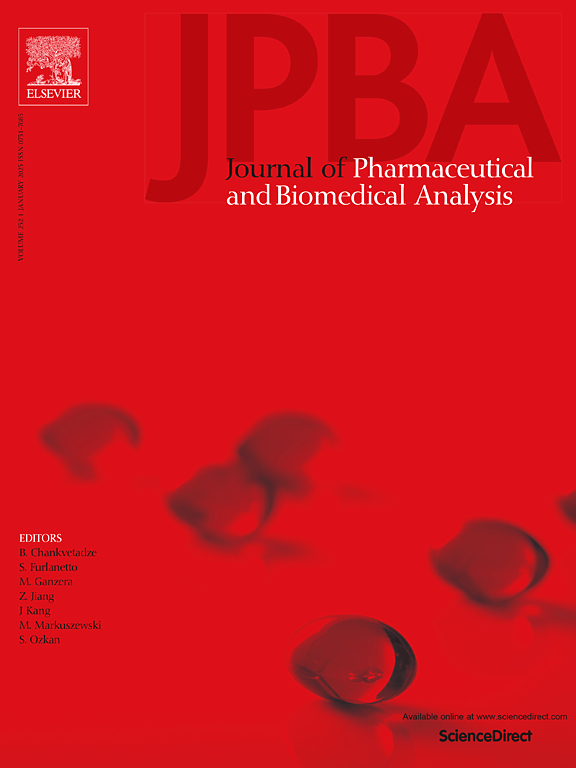代谢组学和MCDM方法在开发疾病诊断新策略中的应用:原发性Sjögren综合征的案例研究
IF 3.1
3区 医学
Q2 CHEMISTRY, ANALYTICAL
Journal of pharmaceutical and biomedical analysis
Pub Date : 2025-07-25
DOI:10.1016/j.jpba.2025.117080
引用次数: 0
摘要
原发性Sjögren综合征(pSS)是一种病因不明的复杂自身免疫性疾病。由于缺乏单一的诊断金标准,pSS通常需要多学科和侵入性检查,强调迫切需要创新的非侵入性方法来简化诊断过程。利用机器学习和代谢组学的进步,本研究开发了一种新的诊断策略,使用来自93名pSS患者和42名健康对照者的粪便非靶向代谢组学数据,这些数据是通过液相色谱-质谱(LC-MS)获得的。通过Shapley加性解释(SHAP)和多准则决策(MCDM)的特征优化,从151种代谢物中鉴定出10种关键差异代谢物。集成了6个机器学习模型的堆叠集成框架实现了卓越的诊断性能(AUC: 0.98,灵敏度:0.97,特异性:0.90,召回率:0.93,准确率:0.95),超过了单个模型的输出。同时建立了方便用户的可视化代谢诊断系统,以提高临床应用。这些发现表明,将机器学习整合到代谢组学研究中,为pSS诊断提供了一种强大的、无创的解决方案,具有高度的通用性和临床适用性。这种综合方法不仅解决了pSS的关键诊断挑战,而且为探索其他复杂疾病的代谢生物标志物建立了方法范式。本文章由计算机程序翻译,如有差异,请以英文原文为准。
Application of metabolomics and MCDM approach in developing a novel strategy for disease diagnosis: A case study in Primary Sjögren's Syndrome
Primary Sjögren's Syndrome (pSS) is a complex autoimmune disease with an unclear etiology. Due to the lack of a single diagnostic gold standard, multidisciplinary and invasive examinations are often required for pSS, underscoring the urgent need for innovative non-invasive approaches to simplify the diagnostic process. Leveraging advances in machine learning and metabolomics, this study developed a novel diagnostic strategy using fecal non-targeted metabolomics data from 93 pSS patients and 42 healthy controls acquired via liquid chromatography-mass spectrometry (LC-MS). Through rigorous feature optimization with Shapley additive explanations (SHAP) and multi-criteria decision-making (MCDM), 10 pivotal differential metabolites were identified from 151 metabolites. A stacking ensemble framework integrating six machine learning models achieved exceptional diagnostic performance (AUC: 0.98, sensitivity: 0.97, specificity: 0.90, recall: 0.93, accuracy: 0.95), surpassing individual model outputs. A user-friendly visualized metabolic diagnostic system was concurrently established to enhance clinical application. These findings demonstrate that integrating machine learning into metabolomics research provides a robust, non-invasive solution for pSS diagnosis, with high generalizability and clinical applicability. This integrative approach not only addresses critical diagnostic challenges in pSS but also establishes a methodological paradigm for exploring metabolic biomarkers in other complex diseases.
求助全文
通过发布文献求助,成功后即可免费获取论文全文。
去求助
来源期刊
CiteScore
6.70
自引率
5.90%
发文量
588
审稿时长
37 days
期刊介绍:
This journal is an international medium directed towards the needs of academic, clinical, government and industrial analysis by publishing original research reports and critical reviews on pharmaceutical and biomedical analysis. It covers the interdisciplinary aspects of analysis in the pharmaceutical, biomedical and clinical sciences, including developments in analytical methodology, instrumentation, computation and interpretation. Submissions on novel applications focusing on drug purity and stability studies, pharmacokinetics, therapeutic monitoring, metabolic profiling; drug-related aspects of analytical biochemistry and forensic toxicology; quality assurance in the pharmaceutical industry are also welcome.
Studies from areas of well established and poorly selective methods, such as UV-VIS spectrophotometry (including derivative and multi-wavelength measurements), basic electroanalytical (potentiometric, polarographic and voltammetric) methods, fluorimetry, flow-injection analysis, etc. are accepted for publication in exceptional cases only, if a unique and substantial advantage over presently known systems is demonstrated. The same applies to the assay of simple drug formulations by any kind of methods and the determination of drugs in biological samples based merely on spiked samples. Drug purity/stability studies should contain information on the structure elucidation of the impurities/degradants.

 求助内容:
求助内容: 应助结果提醒方式:
应助结果提醒方式:


